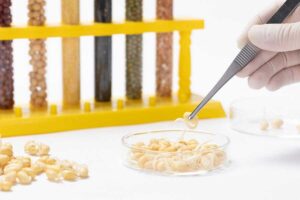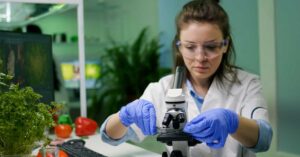The U.S. Food and Drug Administration (FDA) has published an update to its guidance for voluntary premarket engagement regarding foods derived from genome-edited plants. This initiative highlights the agency’s commitment to ensuring food safety while fostering innovation in agricultural biotechnology.
The FDA’s update includes the release of an inventory of voluntary premarket meetings held with developers of genome-edited plant-based foods. These meetings are intended to provide a platform for early engagement, allowing developers to address potential safety and regulatory concerns before marketing their products.
This inventory serves as a public resource, offering transparency into the types of products entering the market and the FDA’s role in ensuring their compliance with food safety standards.
A Distinction in Premarket Processes
The FDA’s guidance outlines two distinct premarket processes:
- Voluntary Premarket Engagement: Designed for genome-edited foods with lower risk characteristics, this process allows developers to discuss their products and clarify regulatory expectations.
- Voluntary Premarket Consultation: Recommended for products that may pose greater safety or regulatory challenges, this pathway involves a more comprehensive review process.
As you can see, both processes are voluntary but provide developers with valuable insights to streamline their product’s market entry.
A Growing Inventory
The FDA’s inventory of voluntary premarket meetings is expected to expand as more developers engage with the agency. By maintaining this resource, the FDA aims to encourage transparency and provide a clearer understanding of the safety evaluations associated with genome-edited foods.
Implications for Developers
This update underscores the importance of proactive collaboration between food developers and the FDA. By participating in voluntary premarket engagement, developers can:
- Gain early feedback on potential safety issues.
- Ensure compliance with regulatory requirements.
- Expedite the commercialization of genome-edited products.
Foods derived from genome-edited plants must meet Generally Recognized As Safe (GRAS) standards. GRAS status is granted when the FDA determines that a food is as safe as conventional foods. It involves a rigorous review of safety data, including toxicology and allergen testing, to ensure consumer health is protected. Because these foods involve genetic modifications, proving their safety is essential before they reach consumers.
This process might seem overwhelming, but you don’t have to go it alone. Experts like Quality Smart Solutions and GRAS Experts specialize in helping developers navigate GRAS requirements. Their guidance can save you time, ensure compliance, and streamline your journey to market.
The Broader Context
Genome editing has become a cornerstone of agricultural innovation, offering opportunities to enhance crop yields, improve nutritional content, and reduce environmental impacts. As these technologies evolve, the FDA’s guidance serves as a critical framework for balancing innovation with safety.
The agency reaffirmed that all foods derived from genome-edited plants must meet the same rigorous safety standards as other foods, emphasizing its commitment to public health.
Accessing the Guidance
Developers and stakeholders can review the full guidance and inventory on the FDA’s website. The agency encourages developers to consider these resources as part of their product development and regulatory planning.
For more information, visit the FDA’s official update.








